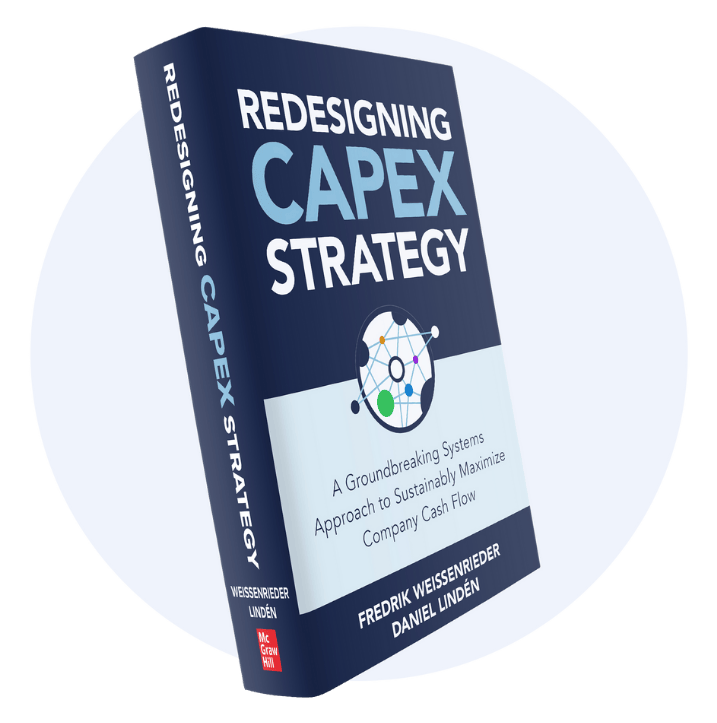The business you run today is the result of yesterday’s capital-allocation calls. Tomorrow’s performance depends entirely on the ones you make next.
We break that pattern.
Yet most Capex decisions are made in isolation, optimizing the part, not the whole, destroying future company cash flow in the process.
We’re not a typical consultancy. We deliver a detailed, actionable Recommendation for Action, covering your entire production system: every mill, line, and logistics loop. We show you exactly where to invest, where to divest, and when, to maximize future cash flow.
Unlike traditional advisory firms, we don’t stay longer than needed. We’re in and out in three to four months, leaving you and your team with the clarity, tools, and control to move forward independently.
CEO Capex Strategy:
Capital allocation is your most powerful lever
From fragmented projects to a whole-system approach that drives business growth
Traditional capital allocation methods evaluate projects in isolation, often leading to suboptimal returns. We take a unique, whole-system approach to how capital is allocated:
Company-wide capital optimization: ensuring that every investment contributes to business growth, not just local project ROI.
Maximizing cash flow impact: a strategic method to improve financial outcomes rather than just approving isolated Capex projects.
Alignment with business objectives: investment decisions that support the long-term goals of the company and its shareholders.
“Significant for winning corporations is that they understand that the ongoing process of consolidation continues unabated, even in growing markets. They plan years ahead for these developments, resulting in making fewer bad and more good capex decisions.”
-Fredrik Weissenrieder, Founder
A clear framework to boost future cash flow
In just 12-18 weeks, we deliver a board-ready capital allocation plan designed to improve future cash flow by 20–45%.
No isolated NPVs. No internal politics. Just one transparent roadmap aligned with long-term value creation.
This is not theory. It’s applied systems economics.
Founded in Sweden, RECAST pioneered the concept of Capex Strategy in capital-intensive industries. Since 2004, we have helped leadership teams across more than 1,000 industrial sites unlock over billions in value by treating Capex as strategy, not cost.
If your Capex process is still bottom-up, driven by local needs and short paybacks, it’s not just outdated. It’s structurally inefficient.
We help you stop it. And reverse it.
This approach helps companies move from fragmented decisions to system-wide capital strategy — aligning every investment with long-term performance, not just local ROI.
“It’s about transforming the way you look at capital allocation and seeing that you’re completely wrong. It’s about realizing that capex strategy is the enterprise’s strategy.”
-John Williams, CEO of Domtar Corporation
Trusted by industry leaders in capital-intensive industries
With over 25 years of experience, we’ve transformed capital strategies in major industrial sectors, including:
- Metals & Mining
- Steel
- Copper
- Pulp & Paper
- Wood Products
- Energy Production
- Packaging
- Food
- Petrochemicals
- Downstream operations
- and more
Want to talk to a peer in your industry?
We’ve worked closely with CEOs across these sectors to rethink how capital gets allocated, turning Capex from a budgeting exercise into a strategic weapon. Many of them are open to sharing their experience, what changed, what they learned, and the results they achieved.
Reach out, and we’ll connect you directly with a CEO who can speak to the results.
The Book that changed how companies think about capex
Redesigning Capex Strategy (McGraw-Hill, 2022) outlines the same methodology we’ve used to help capital-intensive companies unlock cash flow, align investments with strategy, and drive long-term value, not just short-term returns.
Written by our founders, Fredrik Weissenrieder and Daniel Lindén, the book distills decades of real-world experience across 1,000+ industrial sites into a single, clear message:
Capex decisions aren’t just financial — they’re strategic.
And most companies are getting them wrong.
It explores:
Why even well-executed projects often fail to improve overall company performance
How fragmented investment logic weakens strategic momentum
What changes when capital decisions are made with system-wide visibility and long-term goals
This is the thinking behind how we help companies make better capital decisions, faster.
Want to preview it?
Listen to an extended excerpt on YouTube
or find the full audiobook on Storytel, Google Play Books, or your favourite audio platform.
Prefer to read?
Order the book at Barnes & Noble or Amazon or at your favorite bookseller.
“The simplicity in the methodology has helped us to focus on company cash flow and long-term strategy. We have a much better understanding of the relationship between investments and long-term shareholder value. ”
-Henrik Sjölund, President & CEO of Holmen
Why most capex processes destroy value, and what to do instead
Our white paper, “The Capex Process: The Tail Wags the Dog,” reveals why well-intended systems, taught in business schools and practiced in boardrooms, routinely steer capital into the wrong places.
Drawing on 30+ years of experience, we lay out the root causes of value destruction and the system-level shifts required to fix it. Clear, real-world insight into how to turn your capex process into a driver of future cash flow.
✔ Identify structural flaws that cost companies millions in wasted capex
✔ Learn from data-backed case examples, not frameworks
✔ Get practical steps to transform how capital gets allocated, company-wide, not project-by-project
Is your capital strategy delivering the results it should?
We help companies maximize long-term value by rethinking how capital is allocated across the entire system. Whether you’re planning a major capital project or seeking to optimize existing assets, our expertise and proven strategies can guide you toward smarter, more impactful investment decisions.









